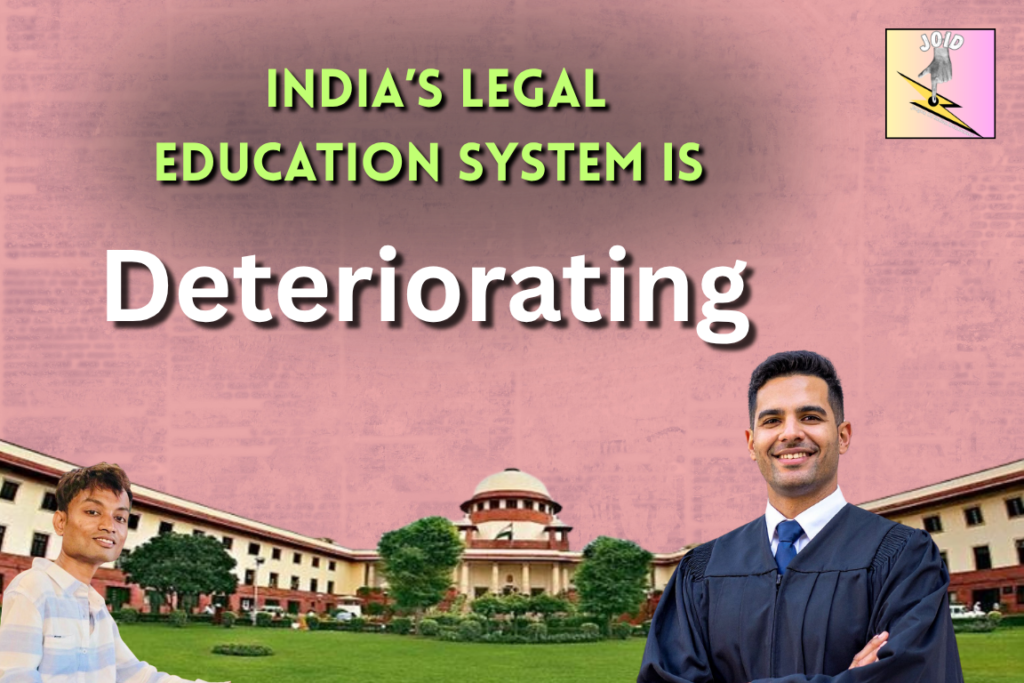
India’s oldest law colleges some over a hundred years old now resemble relics of lost glory, not institutions of justice. Despite their grand legacy, many of these state-run colleges are failing the very students they were meant to empower. Today, thousands of LLB graduates from institutions such as Government Law College (Mumbai), Calcutta University’s Faculty of Law, and Dr. Babasaheb Ambedkar College of Law (Nagpur) are walking out with degrees but without jobs, skills, or direction. The promise of justice is being betrayed not in courts, but in classrooms.
A 2023 Bar Council of India (BCI) internal survey accessed via RTI reveals that over 72% of law graduates from government law colleges earn less than ₹15,000/month, and a majority remain underemployed or unemployed. Only 4% had access to structured placement opportunities, and fewer than 0.5% received offers from Tier-1 or Tier-2 law firms. These numbers point not to individual shortcomings, but to systemic failure on a national scale.
While elite law schools like NLSIU, NALSAR, and Jindal Global Law School report average placement packages ranging from ₹10–17 lakh per annum, graduates from most public colleges struggle to find clerkships paying even ₹5,000 per month. India has effectively created a dual-track legal education system: one that caters to the privileged and English-speaking elite, and another that sets up students from rural, Bahujan, and economically weaker backgrounds for disappointment.
The collapse begins at the point of admission. State CET cells particularly in Maharashtra continue to admit students into colleges that have neither proper accreditation nor faculty. A 2024 RTI revealed that of over 180 law colleges in Maharashtra, fewer than 30 were actively regulated or compliant with BCI norms. Many lacked NAAC ratings, development councils, or functioning libraries. The Times of India reported this year that even the University of Mumbai blocked admissions to 229 colleges for similar violations.
What’s worse is the complete absence of institutional accountability. Most law colleges have no placement cell, no internship network, and no courtroom exposure programs. Students finish three or five-year degrees without ever stepping into a real court or learning how to draft a bail application. Faculty members often lack practical legal experience and teach procedural law without having argued a single case. As a result, students are theoretically literate but professionally paralyzed.
This systemic neglect affects all students but disproportionately harms those from historically disadvantaged communities. Many SC, ST, OBC, and first-generation learners enter these colleges with aspirations of serving justice or joining the judiciary. But they graduate into a market that offers them neither mentorship nor money. With no institutional support, many work unpaid for years or leave the profession altogether. It is not an exaggeration to call this a structural betrayal of Constitutional principles.
The problem is not limited to legal education. Reports have shown declining placement rates across public universities and even some IITs and NITs. DAVV, one of Madhya Pradesh’s largest universities, saw placement rates fall below 10% in 2024. However, law is a uniquely sensitive domain. Here, failure doesn’t just mean joblessness it risks eroding the quality of justice delivery itself. Underprepared lawyers make for weak defenders of rights, compromised litigation, and fragile jurisprudence.
The time for polite recommendations is over. India needs an urgent audit of all law colleges, especially legacy institutions running for over 50 years. Unrecognized or non-compliant colleges must be shut down immediately. Regulatory bodies such as the BCI and state CET cells should be held legally accountable under consumer protection and education fraud laws for admitting students into colleges that do not meet minimum standards.
Reforms must include a national law placement portal, universal access to court internships, legal aid centers linked to colleges, and special mentorship programs for students from SC/ST/OBC/EWS backgrounds. Faculty qualifications must include real courtroom experience, not just UGC clearance. Without these structural corrections, the legal profession will remain exclusionary and unjust.
A country cannot afford a legal system where its very foot soldiers ,young lawyers are undertrained, unpaid, and uninspired. Law, unlike engineering or business, is not just a profession it’s a public trust. When legal education collapses, democracy itself begins to wobble. If we do not fix the classrooms now, the consequences will spill over into our courts, our legislatures, and our society.
India’s legal education system is standing on the edge. Either we rebuild it with equity, quality, and constitutional morality or we allow it to sink further, dragging thousands of dreams with it.
Our other articles : Does Bengal Have a PR Problem? | A scenario of “What ifs” in Bihar | German Chancellor Fellowship discussion |Mission 58: How Congress Plans to Flip Bihar | Bengal Bellwether – 2 | Bengal Bellwether – 1 | India United – India’s message is loud & clear on terrorism a diplomatic strike on terror| The Indian Stock Market is bleeding | SUPER NARI – 25 | Caste and the Ballot in Bihar | The suicidal mission of Pakistan’s so called ‘Establishment’ | Who is Responsible for Bihar’s Migration Crisis? | Why Congress must go solo in Bihar | Jai Bhim | Old is Gold , Resurrection of ‘Dynasty Politics’ | China Faces 125% Tariff by USA: A Strategic Opportunity for India | When the Accuser Becomes the Accused
Books that enriches – India after Gandhi by Ramchandra Guha | Contesting democratic deficit by Salman Khurshid | The election that surprised India By Rajdeep Sardesai

Mayur Gavture is a Political Strategy Consultant and currently working as the legislative & Political Associate at the Office of Hon. Member of Parliament Shri Namdev Kirsan. He also has interests in Election Campaign , Legislative Policy – Advocacy & Governance Advisor.
